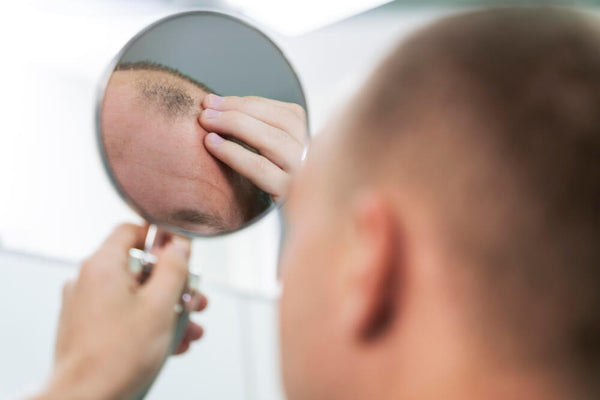Let's be honest. There are few things as frustrating as watching more and more of your hair circle the drain. You see the thinning around your temples, the widening part, the ponytail that just isn't as thick as it used to be. And you're left wondering, "What am I doing wrong?"
Maybe you've switched your products a dozen times. But what if the problem isn't on your scalp at all? What if it's a silent, internal conversation—or should we say, argument—between your hormones?
As a functional medicine trichologist who works primarily with Black women, I can tell you that hormonal hair loss is one of the most common—and most misunderstood—issues we see. It's not just in your head; it's in your biochemistry. Let's break down the real culprits and why that generic biotin pill isn't cutting it.

The Usual Suspects: Which Hormones Are Sabotaging Your Hair?
Think of your hormones as an orchestra. When they're in harmony, everything works beautifully, including hair growth. But when one instrument is off-key, the whole symphony falls apart. Here are the key players that often go rogue.
-
DHT: The Follicle Bully
You've probably heard of DHT. It's a derivative of testosterone, and in high levels around the follicle, it's a straight-up bully. It slowly shrinks your hair follicles, making them produce thinner, weaker hairs until they eventually give up and stop growing altogether. This is a key driver in female pattern hair loss, and it doesn't care how old you are.
-
The Estrogen & Progesterone Tug-of-War
This is a big one for women, especially in our community. Estrogen is generally hair-friendly, keeping your hair in its growth phase longer. But its partner, progesterone, is crucial for balance.
When you're stressed, entering perimenopause, or dealing with conditions like PCOS, progesterone can take a nosedive. This creates "estrogen dominance," where estrogen isn't necessarily high, but it's unopposed. This imbalance can trigger shedding and thin, lackluster hair.
And post-pregnancy? That dramatic drop in estrogen is what causes that terrifying postpartum shed. It's a normal, but emotionally draining, hormonal shift.
Thyroid Hormones: Your Body's Master Regulator
Your thyroid gland is basically your metabolism's thermostat. When it's underactive (hypothyroidism), everything slows down—including hair growth. Your hair becomes dry, brittle, and starts to thin not just on your head, but often the outer third of your eyebrows, too. This is so common and it's one of the first things we check.
Prolactin is another hormone that tells your body to produce breast milk. But high levels when you're not breastfeeding? That's a red flag. Often linked to stress or a benign pituitary tumor, elevated prolactin can directly interfere with ovulation and crash your estrogen levels, leading to a diffuse, thinning hair loss pattern that feels impossible to reverse.
Why Your "Normal" Lab Results Don't Tell the Whole Story
This is where I need to be straight with you. You might have gone to your doctor, gotten your hormones checked, and been told everything is "normal."
But here's the truth we operate on in functional medicine: "Normal" is not the same as "optimal."
A standard lab range is built on a bell curve of a sick population. Your levels might be "normal" but still be far from where they need to be for you to feel vibrant and for your hair to thrive. We look for the optimal zones. We also look at ratios—like the critical balance between estrogen and progesterone—that standard doctors often overlook.
Our Approach: Finding Your Root Cause, Not Just Masking Symptoms
Throwing a random "hair, skin, and nails" supplement at a complex hormonal issue is like using a band-aid on a broken arm. It's not going to fix the underlying problem. At Nina Ross Hair Therapy, we do things differently.
-
Advanced, Precision Testing: We don't guess. We use comprehensive hormone panels that look at your levels of DHT, Estrogen, Progesterone, Thyroid, Cortisol, and more. We often use DUTCH testing which gives us a detailed picture of how your body actually metabolizes these hormones.
-
Personalized Protocol Development: Once we have your details and test results, we build your route to recovery. Your plan may include Bioidentical Hormone Replacement Therapy (BHRT) that’ll gently replenish what your body is missing and Medical-Grade supplements. These supplements like DIM or Saw Palmetto help your body metabolize excess hormones and block the effects of DHT.
-
Regenerative Support: While we take care of your internal issues, we also use treatments like PRP (Platelet-Rich Plasma) Therapy and Exosome Therapy to reduce inflammation on the scalp and stimulate a new, healthy growth cycle for the follicles.
Ready to Silence the Hormonal Noise and Hear Your Hair Grow?
I know how deeply personal and distressing hair loss is. It chips away at your confidence. But you don't have to just accept it as your "new normal." Your hormones don't have to be the boss of your hair forever.
If you're tired of getting "normal" lab results while your hair tells a different story, it's time for a different approach. Book your Hair Therapy Evaluation for just $99 and let us understand the exact root cause of your hair issues.















